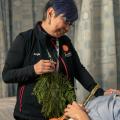Cushing's syndrome
An overview of Providence Health Care’s services and resources for adults experiencing Cushing's syndrome.
Overview
Cushing’s syndrome is an umbrella term for a group of rare conditions. In them, people have too much of the steroid hormone cortisol in their bodies.
The adrenal glands, which sit on top of the kidneys, make cortisol. It regulates the body’s response to stress.
Too much cortisol can cause these conditions:
- A full, puffy face,
- acne,
- fat deposits in the abdomen and the back of the neck,
- loss of weight in the arms and legs,
- redness on the face,
- easy bruising, and
- stretch marks.
Over time, Cushing’s syndrome can lead to diabetes and high blood pressure. It can also cause lowered immunity, which can lead to an increased risk for infections.
It can put some patients at a higher risk for blood clots.
Along with the physical symptoms, there may be psychological changes like depression. This may happen because of distress from the physical symptoms. It may also happen because of the direct effects of cortisol on the brain.
Most cases of Cushing’s syndrome result when patients are given too much steroid to treat a condition. Doctors use steroid treatment to treat conditions with inflammation, like asthma.
Sometimes the body itself produces excess steroid due to tumors. Some of these are benign tumours of the adrenal gland.
A benign tumour on the pituitary gland in the brain can cause the adrenal glands to produce too much steroid. When a pituitary tumor causes Cushing’s syndrome, it's called Cushing’s disease. This disease is rare, with less than 75 cases in British Columbia a year. Cushing’s disease affects about three times more women than men.
Contact
Endocrinology at St. Paul’s Hospital and Vancouver General Hospital
Diagnosis & testing
Doctors can usually diagnose Cushing's syndrome when they know that patients are taking steroids.
Doctors can find tumors that produce cortisol using blood, saliva, and other tests. These tests detect excess cortisol in the body.
An MRI scan of the pituitary gland diagnoses the tumour linked to Cushing’s disease. Ultrasound, CT or MRI scans of the adrenals can identify adrenal tumours.
Treatment & management
Treatment for Cushing’s syndrome involves reducing the amount of steroid therapy for the patient.
Related surgeries & procedures
Cushing’s disease involves surgery to remove the pituitary-gland tumour. About 50 to 75 per cent of the time, surgery is successful. If it is not, patients will need more treatment. The treatment will aim to block the adrenal glands from making cortisol.
Surgery is usually required for patients with Cushing’s disease. Surgery on the pituitary is usually done through the nose. Patients usually stay in the hospital between three and five days.
Patients may need radiation therapy to shrink any remaining part of the tumour.
Sometimes your surgeon may decide to remove the adrenal glands altogether. Patients then need longer-term steroid replacement because the body no longer makes it.
When a tumour in an adrenal gland causes the excess steroid, that gland is removed by laparoscopic surgery.
Cushing’s syndrome requires no follow-up medication. Doctors treat the patient by reducing the steroids they take.
For Cushing’s disease, if surgery is not successful, medications are needed. These include medication like ketoconazole, which blocks cortisol production.
Support services
Support for Indigenous Peoples
The Indigenous Wellness Liaison Team is here to support your health journey. Team members offer cultural support and healthcare advocacy. Learn more below or call them at 604-682-2344,62937 or email IWL@providencehealth.bc.ca.
Clinical trials & research
Advances in treatments are all thanks to medical research. While participating in research is a decision you should make for yourself in consultation with your care team, there is much activity in this area so please ask us about our research programs if you’re interested.
By taking part in research, you can help us all learn more about advancing health outcomes and find better ways to help people live and thrive. While you cannot assume benefit to yourself, your participation can make a difference in improving care for future patients.
The following clinical trials are currently enrolling volunteers. Please ask your care team for more information or contact the research team listed on each study or trial. For other information about research at Providence Health Care, please visit Providence Research.
Medical & professional referrals
Your doctor will need to provide a referral.
News & stories
Last reviewed: March 28, 2024
